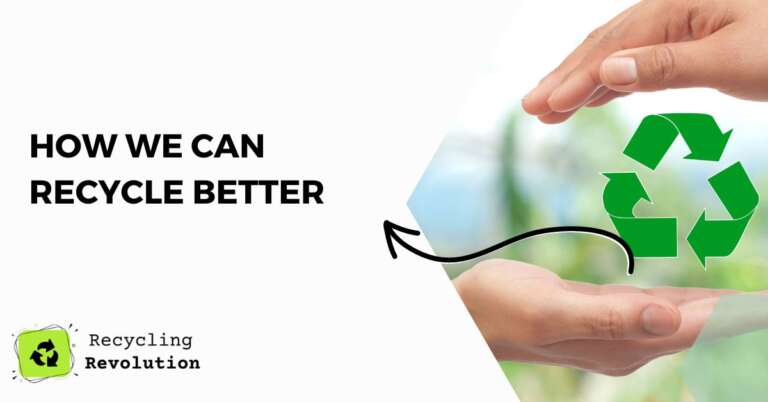Recycling is not just a buzzword in environmental circles; it’s a vital step towards sustainability and fighting the threats of climate change. As we all know, the earth’s resources are finite. By recycling, we give these resources a second life and reduce the demand for virgin materials, thereby protecting the environment.
TL;DR: The key to better recycling lies in understanding its basic principles – Reduce, Reuse, Recycle. By incorporating small yet significant changes in our everyday life such as meticulously sorting our waste, purchasing recyclable products, reducing single-use items, composting organic waste, and by spreading awareness and taking part in local recycling initiatives, we can all contribute towards a healthier planet.
In the face of a global waste management crisis, I strongly recommend everyone to make recycling a part of their daily routine. It not only conserves resources and reduces landfill waste but also saves energy and reduces greenhouse gas emissions.
The Three R’s: Reduce, Reuse, Recycle
A sustainable lifestyle begins by following the “Three R’s” mantra: Reduce, Reuse, Recycle.
- Reduce: The first step to better recycling is to reduce consumption. By making mindful choices and only buying what we need, we can significantly reduce the amount of waste generated.
- Reuse: Before you throw something away, consider if it can be reused. Old jars can become storage containers, tattered clothing can become cleaning rags – the possibilities are endless!
- Recycle: When you can’t reduce or reuse, recycle. Proper recycling allows materials to be processed and transformed into new products, preventing waste and conserving resources.
Understanding Different Types of Waste
A common misunderstanding that hinders effective recycling is not knowing how to segregate waste. It’s essential to understand that not all waste is created equal. Here are the main categories:
- General Waste: Items that cannot be recycled and need to be sent to the landfill.
- Recyclable Materials: These include paper, cardboard, certain types of plastic, metal, and glass.
- Organic Waste: Organic waste, like fruit peels and vegetable scraps, can be composted at home.
- Hazardous Waste: Items like batteries, paints, chemicals, and certain electronics must be disposed of safely to prevent harm to the environment.
How to Recycle Better: Effective Strategies
Better Waste Segregation
One of the simplest things we can do to recycle better is segregating our waste. Properly sorting waste ensures that recyclable materials do not end up in the landfill.
Buy Recyclable Products
Another strategy is to buy products packaged in recyclable materials. This creates demand for recycled products and encourages more companies to switch to sustainable packaging.
Reduce Single-Use Items
Single-use items like plastic bags, cutlery, and straws contribute massively to waste. Replacing these with reusable alternatives can significantly reduce the amount of waste we generate.
Compost Organic Waste
Composting is a great way to recycle organic waste. It enriches the soil in your garden and reduces the amount of waste that goes to the landfill.
Spread Awareness
Last but not least, share your knowledge about recycling with your friends and community. The more people involved, the bigger the impact we can make.
The Role of Manufacturers and Companies
While individual efforts are critical, it’s worth noting that manufacturers and companies also play a significant role in better recycling practices.
Encouraging companies to take responsibility for the life-cycle of their products can significantly reduce waste. This concept is known as extended producer responsibility (EPR).
As consumers, we can influence these practices. I recommend supporting companies that use recyclable packaging, take back used products, and demonstrate commitment to sustainable practices.
Participate in Local Recycling Programs
Community participation in local recycling programs is another excellent way to recycle better. Many municipalities have curbside recycling programs that make it easy for residents to recycle. These programs often accept a variety of materials, including paper, cardboard, metal cans, and certain types of plastic.
In addition, many cities have recycling centers where residents can drop off items not accepted in curbside programs, such as electronics, batteries, and hazardous waste. Participating in these programs not only recycles materials but also supports your local economy.
The Impact of Composting
Composting at home is a simple and effective way to recycle organic waste like fruit and vegetable scraps, coffee grounds, and yard waste.
Composting these materials not only reduces the amount of waste going to landfills but also creates a nutrient-rich soil amendment that’s great for gardening.
Starting a compost pile at home is easier than you might think. I suggest starting with a simple pile or compost bin in your backyard, adding organic waste as you generate it, and turning the pile regularly to help it decompose.
The Problem with Wishcycling
While it’s crucial to recycle, it’s equally important to avoid “wishcycling.” This term refers to the act of putting non-recyclable items in the recycling bin in the hope that they can be recycled. Wishcycling can contaminate recyclable materials and make the recycling process more difficult and expensive.
To avoid wishcycling, it’s essential to understand what materials your local recycling program accepts. When in doubt, it’s better to throw it out than to risk contaminating the recycling stream.
The Power of Education and Advocacy
Education and advocacy are also powerful tools in the quest for better recycling. By learning about recycling and sharing that knowledge with others, we can help more people recycle correctly.
Many people want to recycle but don’t know where to start or what can be recycled. Sharing information about local recycling programs, what can and can’t be recycled, and how to reduce waste can help more people recycle better.
Moreover, advocacy can help drive policy changes that support recycling. By advocating for policies like extended producer responsibility and bottle deposit programs, we can encourage more recycling and less waste.
Conclusion
In conclusion, the journey to better recycling isn’t necessarily a hard one, but it requires conscious effort and dedication. By understanding the types of waste and the principles of reducing, reusing, and recycling, we can all contribute to a more sustainable world.
FAQs
Can all plastics be recycled?
No, not all plastics can be recycled. Plastics are classified into seven types, and only 1, 2, and sometimes 5 are commonly recycled. Check the recycling symbols on the packaging before disposing of them.
What are some alternatives to single-use items?
Some alternatives to single-use items include reusable shopping bags, metal straws, cloth napkins, and refillable water bottles.
How can I recycle electronics?
Electronics contain precious metals that can be recovered and hazardous materials that need to be disposed of safely. Many electronic manufacturers and retailers offer take-back programs or have e-waste recycling events.
How can I start composting at home?
Starting a compost pile at home is easier than it sounds. All you need is a compost bin or designated area in your garden where you can dump your organic waste. The pile needs to be turned regularly to aid decomposition.

